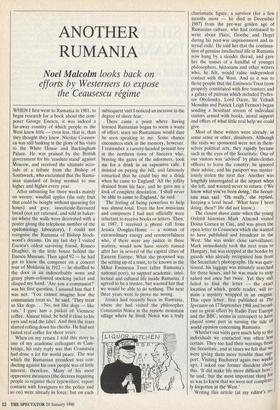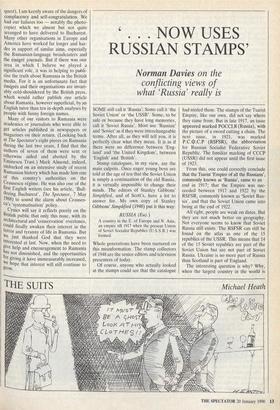ANOTHER RUMANIA
Noel Malcolm looks back on Noel Malcolm looks back on
efforts by Westerners to expose the Ceausescu regime
WHEN I first went to Rumania in 1981, to begin research for a book about the com- poser George Enescu, it was indeed a far-away country of which people in the West knew little — even less, that is, than they thought they knew. Nicolae Ceauses- cu was still basking in the glory of his visits to the White House and Buckingham Palace. He was praised by the British government for his 'resolute stand' against Moscow, and received the ultimate acco- lade of a tribute from the Bishop of Southwark, who exclaimed that the Ruma- nian standard of living seemed to rise higher and higher every year.
After subsisting for three weeks mainly on wormy, windfall apples (the only fruit that could be bought without queueing for hours) and grey, insecticide-flavoured bread (not yet rationed, and sold in baker- ies where the walls were decorated with a poster giving the telephone number of the epidemiology laboratory), I could not recognise the Rumania of Bishop Stock- wood's dreams. On my last day I visited Enescu's oldest surviving friend, Romeo Draghici, in the little house behind the Enescu Museum. Then aged 92 — he had got to know the composer on a concert tour of Moldavia in 1912 — he shuffled to the door in an indescribably worn and grimy plum-coloured smoking jacket and clasped my hand. 'Are you a communist?' was his first question. I assured him that I was not. 'You cannot imagine how the communists treat us,' he said. 'They treat us like dogs.... No, not like dogs — like rats.' I gave him a packet of Viennese coffee. Almost blind, he held it close to his eyes and read the label. And then the tears started rolling down his cheeks. He had not tasted real coffee for three years.
When on my return I told this story to one of my academic colleagues in Cam- bridge, his only reply was that Ceausescu had done a lot for world peace. The war which the Rumanian president was con- ducting against his own 'people was of little interest, therefore. Many of his most oppressive measures (the decrees requiring people to register their typewriters, report contacts with foreigners to the police and so on) were already in force; but on each
subsequent visit I noticed an increase in the degree of sheer fear.
There came a point where having learned Rumanian began to seem a waste of effort, since no Rumanians would dare be seen speaking to me. Some chance encounters stick in the memory, however. I remember a carroty-headed peasant boy in the northern town of Suceava who, braving the gazes of the informers, took me for a drink in an expensive café. I insisted on paying the bill, and fatuously remarked that he could buy me a drink when he came to England. All the jollity drained from his face, and he gave me a look of complete desolation. 'I shall never be able to come to England,' he said.
The feeling of being powerless to help was almost total. Even the few musicians and composers I had met officially were reluctant to receive books or letters. Then, in 1987, I received a phone call from Jessica Douglas-Home — a woman of extraordinary energy and resourcefulness who, if there were any justice in these matters, would now have streets named after her in several of the capital cities of Eastern Europe. What she proposed was the setting up of a trust, to be known as the Mihai Eminescu Trust (after Rumania's national poet), to support academic, intel- lectual and cultural life inside Rumania. I agreed to be a trustee, but warned her that we would he able to do nothing. The next three years were to prove me wrong.
Jessica had recently been in Rumania, where she had visited the philosopher Constantin Noica in the remote mountain village where he lived. Noica was a truly charismatic figure, a survivor (for a few months more — he died in December 1987) from the pre-war golden age of Rumanian culture, who had continued to write about Plato, Goethe and Hegel during his post-war imprisonment and in- ternal exile. He told her that the continua- tion of genuine intellectual life in Rumania now hung by a slender thread, and gave her the names of a handful of younger philosophers, historians and other writers who, he felt, would value independent contact with the West. And so it was to those people that the Eminescu Trust (now properly constituted with five trustees and a galaxy of patrons which included Profes- sor Obolensky, Lord Dacre, Sir Yehudi Menuhin and Patrick Leigh Fermor) began sending a hesistant stream of individual visitors armed with books, moral support and offers of what little real help we could give.
Most of these writers were already, in some sense or other, dissidents. Although the visits we sponsored were not in them- selves political acts, they rapidly became such in the eyes of the Securitate. One of
our, visitors was 'advised' by plain-clothes
officers to leave the country; he ignored their advice, and his passport was myster- iously stolen the next day. Another was lengthily interrogated at the airport when she left, and warned never to return. ('We know what you've been doing,' the Securi- tate man said. 'Oh really,' she replied, keeping a level head. 'What have I been doing, then?' He did not know.) The closest shave came when the young Oxford historian Mark Almond visited Doina Cornea in Cluj, and was given the open letter to Ceausescu which she wanted to have published and broadcast in the West. She was under close surveillance; Mark immediately took the next train to Hungary, but was stopped at the border by guards who already recognised him from the Securitate's photographs. He was ques- tioned, his luggage was minutely searched
for three hours, and he was made to strip naked not once but twice. Yet they still failed to find the letter — the exact location of which, gentle reader, will re- main a mystery wrapped in an enigma. This open letter, first published in The Spectator on 17 September 1988 and broad- cast to great effect by Radio Free Europe and the BBC, seems in retrospect to have played some part in turning the tide of world opinion concerning Rumania.
Whether our visits gave much help to the individuals we contacted was often less certain. They too had their warnings from the Securitate, and at times we felt that we were giving them more trouble than sup-. port. Visiting Bucharest again two weeks ago, I asked one former dissident about this. 'It did make life more difficult here', he said, 'but the most important thing for us was to know that we were not complete- ly forgotten in the West.'
Writing this article (at my editor's re'
quest), I am keenly aware of the dangers of complacency and self-congratulation. We had our failures too — notably the photo- copier which we almost but not quite arranged to have delivered to Bucharest. Many other organisations in Europe and America have worked far longer and har- der in support of similar aims, especially the Rumanian-language broadcasters and the émigré journals. But if there was one area in which I believe we played a significant role, it was in helping to publi- cise the truth about Rumania in the British media. For it is an unfortunate fact that emigres and their organisations are invari- ably cold-shouldered by the British press, which would rather publish one article about Rumania, however superficial, by an English tutor than ten in-depth analyses by People with funny foreign names.
Many of our visitors to Rumania were academics or journalists who were able to get articles published in newspapers or magazines on their return. (Looking back at The Spectator's eight pieces on Rumania during the last two years, I find that the authors of seven of them were sent or otherwise aided and abetted by the Eminescu Trust.) Mark Almond, indeed, embarked on an intensive study of recent Rumanian history which has made him one of this country's authorities on the Ceausescu regime. He was also one of the first English writers (see his article, 'Bull- dozing Bucharest', The Spectator, 7 May 1988) to sound the alarm about Ceauses- cu's 'systematisation' policy. Cynics will say it reflects poorly on the British public that only this issue, with its architectural and 'conservation' overtones, could finally awaken their interest in the terror and tyranny of life in Rumania. But !?"e just thanked God that they were interested at last. Now, when the need to give help and encouragement to Rumania has not diminished, and the opportunities Mr giving it have immeasurably increased, We hope that interest will still continue to grow.



















































 Previous page
Previous page